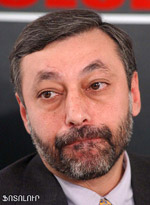“The meaning of the term “political prisoner” is not for just anyone to decide”
-Tigran Torosyan, Chairman of the National Assembly
It never crossed my mind that I would have the opportunity to make a reference to the words of Tigran Torosyan, much less turn it into the preface of my article, but events in Armenia take place in such a way that you are forced to go the extreme and explain elementary things to people (in this case top-ranking government officials).
Nobody wishes to use the term “political prisoner” and I fully agree with Mr. Torosyan with respect to that. The term “political prisoner” is the result of a state/political system that has been in the process of being shaped for many years in the name of democracy, liberties, tolerance and mutual understanding. But by calling that system a democracy, we understand the values imposed on the people, by saying liberty we understand the extent of liberties, and when we say tolerance, we understand the patience of the people who have limited liberties. Totalitarian states don’t state the formulation or explanation of the “political prisoner” concept in their constitutions. They write good things, but sometimes they are even more honest, for example, by underlining the role of the hegemony of a party. This is also not by the “for just anyone to decide”.
“There are no political prisoners in Armenia,” claims Tigran Torosyan, with the fact not even crossing his mind that the Chairman of the former Supreme Soviet Council, which kept the founder of his political party (the now-deceased Ashot Navarsardyan) in prison for years, didn’t stand up and announce ‘You know, there are many political prisoners in the country.’
“There are no political prisoners in Armenia,” Torosyan assuredly claims, perhaps not knowing that Haykaz Khachatryan, the founder of the National United Party (the predecessor of his own party), and whom 98% of Republicans don’t even know, was sentenced for the second time in the ‘70s not due to breaking a political clause, rather for supposedly getting into a “push-and-shove” with his neighbors. Well, in that period of the Soviet Union, it would be absurd to sentence someone for “illegal money laundering” because the Soviet currency was clean and consecrated with the image of Lenin.
“That letter is unacceptable to me because that letter (Raffi Hovhannisian’s letter-T.P) affirms that there are political prisoners in Armenia,” says the chairman of the National Assembly disappointedly. The disappointment could be understood, especially taking into account his great experience in communication with European organizations and, despite the disappointment of the National Assembly Chairman, it all comes down to affirm that Alexander Arzumanyan is a political prisoner. Serge Sargsyan expresses his willingness to receive Arzumanyan’s wife, Melissa Brown and with that, whether he likes it or not, accept that there were political incentives for the accusation. If Arzumanyan is simply a “money-launderer”, a simple criminal, then why is the head of government receiving his wife? I will formulate my question differently: “Why doesn’t the prime minister receive all of the relatives of people who are accused of this or that crime?” But Tigran Torosyan’s partisan official is not only receiving Arzumanyan’s wife, but is also giving her friendly advice to keep away from the journalists and promising to help her release the “money-launderer”. If this is not a political order, if it is not a crime that has enough grounds, with what levers can the prime minister of a legal state influence the police?
A Russian-language paper, which receives its orders from certain high places, has tried to carry out its order and analyzed Alexander Arzumanyan’s political activities, coming to the conclusion, in the way a child reveals a secret in front of family friends, that the former foreign minister was getting ready to become president. While the other newspapers call Arzumanyan a “political prisoner” with their manifest declarations, the organ closest to power confirms that fact.
Frankly, a year ago, like Tigran Torosyan, I thought that the meaning of the term “political prisoner” was not for just anybody to decide, and unlike many journalists, I did not consider editor of the “Zhamanak Yerevan” newspaper Arman Babajanyan as a political prisoner. Now, when Babajanyan has been in prison for a year, it is clear that tailor Arman Babajanyan or carpenter Arman Babajanyan would not sit in prison for even a day. Now I understand that in Armenia the meaning of the term “political prisoner” is the decided by somebody. I even know who that person is and I think that Tigran Torosyan also does.

